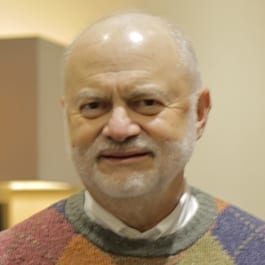Biography
 I grew up in Houston and attended public schools there. My favorite subject was always U.S. history. A teacher’s recommendation that I become involved on the debate team in high school proved transformative. Not only did I thoroughly enjoy the experience (and discovered that I was fairly good at it) but I learned that there was an academic discipline of rhetoric and argumentation theory that underlay my experience. That realization led me to apply to Northwestern, which I knew had both a very strong debate tradition and an outstanding academic program in communication, embedded in a curriculum emphasizing liberal arts.
I grew up in Houston and attended public schools there. My favorite subject was always U.S. history. A teacher’s recommendation that I become involved on the debate team in high school proved transformative. Not only did I thoroughly enjoy the experience (and discovered that I was fairly good at it) but I learned that there was an academic discipline of rhetoric and argumentation theory that underlay my experience. That realization led me to apply to Northwestern, which I knew had both a very strong debate tradition and an outstanding academic program in communication, embedded in a curriculum emphasizing liberal arts.
As an undergraduate, debate was my major preoccupation outside of classes. During those years, my career ambition changed from being a high school teacher and debate coach to being a university professor. I also saw that I could merge my interests in history and in rhetoric by studying public argument and controversies in historical settings. When I was considering graduate schools, I received some advice to go elsewhere, but I decided to stay at Northwestern, largely because a late vacancy created the opportunity for me to do extra teaching right away. While this is generally inadvisable, in my case the department underwent considerable turnover in faculty at this time, so I ended up working largely with different people as a graduate student from what I had done as an undergraduate. Also, in the very first class I taught, I met the woman who would become my wife of 45 years until her death in 2015. We began dating the following year and married the year after that.
In 1970, I was appointed to direct and coach the debate team, which I did for five years as part of my teaching assignment. Then I began a series of administrative appointments, as department chair, associate dean, and dean of what is now the School of Communication. These appointments totaled 25 years, during all of which I continued to teach and to conduct research. My publications include books and articles dealing with U.S. political rhetoric, theories of argumentation, and debate. My last nine years on the faculty were occupied in full-time teaching and research.
Because my entire professional career had been at Northwestern, I was especially concerned to guard against becoming insular in my viewpoints. For this reason, I became quite active in professional organizations (serving as president of both the National Communication Association and the Rhetoric Society of America) and in participating in program reviews at other institutions. I retired in 2009 and have been active in the Northwestern Emeriti Organization, serving as its president in 2018-19. I’m grateful for all Northwestern has contributed to my life as an undergraduate, graduate student, faculty member, administrator, and retiree. My wife, one of my brothers, my son, and my son-in-law are also graduates of Northwestern.
